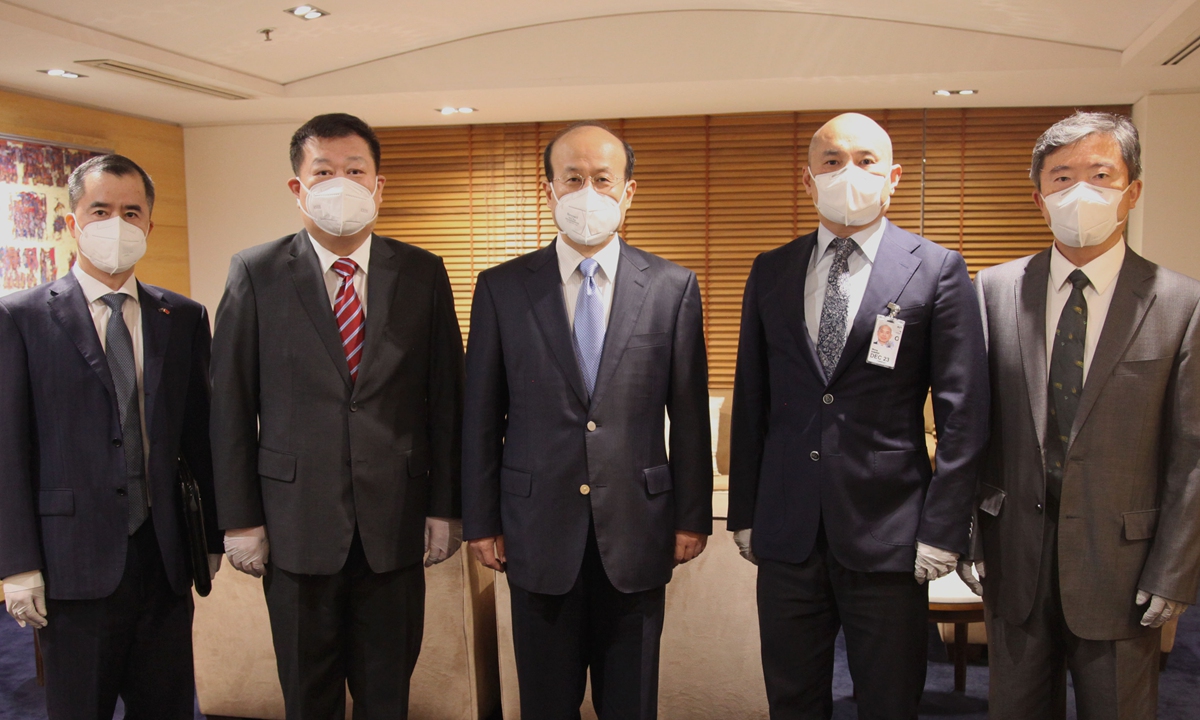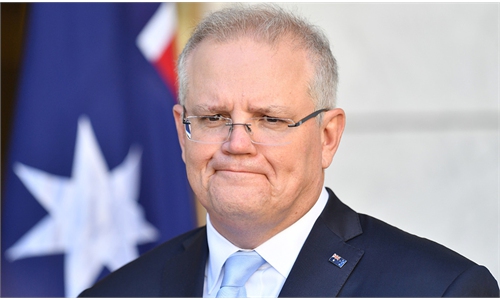New Chinese ambassador to Australia sends 'goodwill' to reset bilateral ties
First message on Australia's national day a 'goodwill' gesture

Ambassador Xiao Qian (center), the new Ambassador Extraordinary and Plenipotentiary of the People's Republic of China to the Commonwealth of Australia arrived in Australia on January 26, 2022 to assume office. Photo: Chinese Embassy in Australia
Xiao Qian, former Chinese ambassador to Indonesia and a veteran diplomat, assumed office of Chinese Ambassador to Australia on Wednesday. In his first remarks, he noted that China and Australia should stay firm in the right direction to keep bilateral relations moving forward.Analysts noted that the new ambassador's message, which was sent on Australia's national day, was a gesture of kindness and goodwill to reset and improve relations, which are at their lowest ebb. They stressed that the Morrison administration should correct its wrong China policies.
"A sound China-Australia relationship serves the fundamental interests of the two countries and two peoples. China and Australia differ in their history, culture, social systems and stages of development, but as long as we adopt a long-term and big-picture perspective, adhere to the principle of mutual respect, equality and mutual benefit, and stay firm in the right direction of bilateral relations, the China-Australia relationship will keep moving forward and make further progress," Ambassador Xiao said in a message released by the Chinese Embassy in Australia on Wednesday.
The Chinese Embassy in Australia is committed to advancing exchanges and cooperation in various fields between the two countries, and promoting the sound and steady development of bilateral relations, Xiao said, noting that he hoped the website of the Chinese Embassy would serve as a window for friends from all walks of life to understand more about China and China-Australia relations, and be a bridge to facilitate exchanges and cooperation between the two countries.
The new ambassador's message was released on Wednesday, January 26, which marks Australia's national day. The ambassador's message carries with it the kindness and willingness to improve bilateral relations, Chen Hong, a professor and director of the Australian Studies Centre, East China Normal University, told the Global Times.
Chen said that this year also marks the 50th anniversary of the establishment of diplomatic relations between China and Australia - which means this year will be a good opportunity for the two countries to reset their damaged relations.
Ambassador Xiao used to work in Indonesia, an important neighbor of Australia. He is also familiar with Australia and its neighbors in Asia. His rich diplomatic experience will also help to dispel misunderstandings, Chen noted.
Xiao, who was born in 1964, is a veteran diplomat who has worked in many countries, including India, the US, the Philippines and Hungary.
Before coming to Australia, Xiao was the ambassador extraordinary and plenipotentiary of China to Indonesia from 2017 to 2021. Before that, he was deputy representative on Korean Peninsular affairs and ambassador on Asian Affairs of Ministry of Foreign Affairs from 2015 to 2016.
On October 29, 2020, Xiao, who was the then Chinese ambassador to Indonesia, responded firmly to the then US secretary of state Mike Pompeo's remarks of hyping China's threats during Pompeo's visit to Indonesia.
Xiao said that the wheels of human history keep moving forward with the trend of inevitable peace. A few US politicians must abandon their wrong and hostile China policy, stop sowing discord and interfering with China's friendly cooperation with regional countries, stop destroying regional peace and stability, and stop trampling on the international order and international justice, or it will only end with total failure.
The year of 2021 witnessed the deterioration of relations between China and Australia due to the latter's closely following the US to make continuous provocations against China on issues that relate to China's core interests.
The former Chinese ambassador Cheng Jingye left the post in October 2021, and in a statement bidding the country farewell, Cheng said that the current difficult situation facing China-Australia relations was "saddening" and he hoped that it could be improved.
However, unlike China's goodwill moves, judging from a string of actions taken since the beginning of the year, the Morrison administration seems to have no willingness to improve the bilateral relations it has damaged, analysts said.
The Australian Prime Minister seemed to go further astray in targeting China. During his speech to the Davos World Economic Forum on January 21, he took aim at China on what he called "economic coercion," foreign interference and cyberattacks.
The Morrison administration and Australian media also accused China of "blocking" Morrison's WeChat public account this week.
Some anti-China hawks in the Morrison administration are working hard to push China-Australia relations to a new low, which also means that the tasks for Ambassador Xiao are tough, Chen said.
Chen said that former Australian leaders met more adversaries when they planned to establish diplomatic relations with China in 1972, but they still made it. Therefore, the key to improving the bilateral relationship lies in whether Australian leaders have the determination to make changes and whether the Morrison administration can make corrections.
Without concrete clashes or territorial disputes, since 1972, China and Australia have built win-win relations, which have improved mutual trust and understanding of the two peoples and benefited both.
If bilateral relations could be reset in the right direction, it would also be good for the two countries and the world in the post-COVID-19 era, Chen noted.




